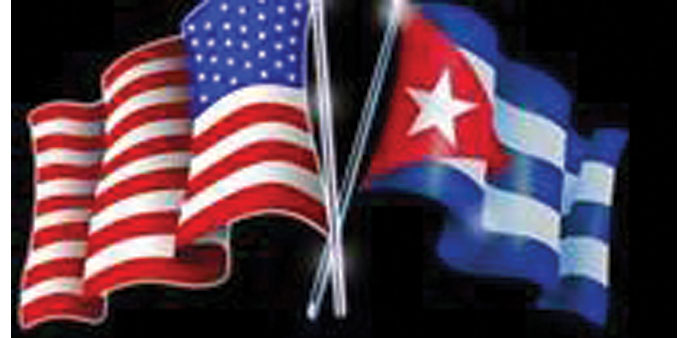Reuters/Washington
The US is set to remove Cuba from the bottom tier on its list of worst human trafficking centres, US sources said, in what will be another step in the historic rapprochement between the former Cold War foes.
The upgrade would lift Cuba to the so-called “Tier 2 Watch List” from Tier 3, where it has languished for 12 years due to allegations of sex trafficking and what US authorities have previously described as “coerced labour with Cuban government work missions abroad.”
The upgrade was contained in a draft report that could be modified by the time of publication, expected this month, said a Congressional aide with knowledge of the report. A second source confirmed the upgrade. The sources requested anonymity.
They attributed the upgrade to better co-operation between Washington and Havana on human trafficking issues and better treatment of victims, but they declined to provide specifics before the State Department publishes the annual Trafficking in Persons report.
The report, which tracks “modern slavery” such as forced labour and the sex trade, is usually released in June but has been delayed this year.
The State Department declined to confirm the upgrade. “Given that the report is not yet finalised, we will not comment on any specific findings,” said State Department spokesman John Kirby.
The thawing with Cuba is part of President Barack Obama’s efforts to reshape American diplomatic relationships with some countries previously seen as enemies, as underlined by Tuesday’s deal to limit Iran’s nuclear ability in return for the lifting of some sanctions and the 2012 opening up to longtime pariah Myanmar.
The Trafficking in Persons report includes four categories: Tier 1 for nations that meet minimum US standards; Tier 2 for those that are making significant efforts to do so; Tier 2 “Watch List” for those that deserve special scrutiny; and Tier 3 for countries that fail to fully comply with the minimum US standards and are not making significant efforts to do so.
Tier 3 countries may face sanctions, including the loss of US aid and US support for World Bank and International Monetary Fund loans, until major overhauls are introduced. Last year there were 23 countries on Tier 3, including North Korea, Syria, Iran and Cuba.
The report was first published in 2001, though Cuba only made its first appearance in 2003.
In an attempt to end US isolation of Cuba, Obama has used his executive powers to relax some travel, business and telecommunications restrictions since sealing a diplomatic breakthrough with Havana in December.
He has urged Congress to ease a 53-year-old US trade embargo, ended Cuba’s designation as a state sponsor of terrorism and announced on July 1 the formal re-establishment of diplomatic relations, including reopening of embassies in each other’s capitals, as part of a “new chapter” of engagement after more than a half-century of estrangement.
An upgrade in the trafficking report will face almost certain criticism from political opponents of Cuba’s Communist government, including some US lawmakers.
Past US reports on Cuba’s human trafficking record have been highly critical, citing allegations of children coerced into prostitution and forced labour in Cuban state-backed overseas’ work missions through a programme that sends thousands of Cuban doctors and nurses abroad.
Passports of those on the missions are sometimes withheld and people have had their movements restricted, previous US reports have said. The Cuban government has denied the allegations.
Cuba has more than 50,000 health workers in more than 60 countries, making professional services the country’s top export earner. Those doctors and nurses generally are well paid by Cuban standards and the positions can be appealing to Cuban medical professionals. In some countries the programmes are very large - for example Cuba has some 30,000 doctors and nurses in Venezuela, a socialist ally that provides Cuba an estimated 125,000 barrels of oil per day.
Some foreign diplomats in Havana say allegations of forced labour in the programme appear overblown.
However, some Cuban doctors and nurses have defected from their overseas missions, complaining of difficult work conditions. Many are openly recruited to defect under the US-funded Cuban Medical Professional Parole Programme, which allows Cuban doctors and other health workers who are overseas to enter the US as refugees.

